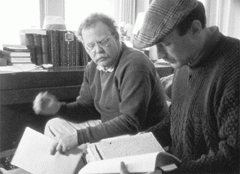A simple film about the solitary pleasures of reading has turned into a successful campaign to revive a short-lived literary career. Dow Mossman’s only novel, The Stones of Summer, was originally published in 1972 by the now-defunct press Bobbs-Merrill. After being lauded by John Seelye in the New York Times Book Review as “a marvelous achievement” that offered “fulfillment at the first stroke, which is so often the sign of superior talent,” the book went out of print and its author faded into obscurity. Last month it was reissued by Barnes & Noble Books.

The book’s recent publication—with a print run 10 times that of the original—is due in large part to the efforts of Mark Moskowitz. An avid reader who has made political campaign ads and short films for over 20 years, Moskowitz wrote, produced, and directed the 2002 documentary Stone Reader, which was recently released on DVD. As much a literary detective story as a meditation on the pleasures of reading, Stone Reader records Moskowitz’s journey across the country to track down the author of a book he loves, a book it seems no one else has ever heard of—The Stones of Summer.
To unravel the story of how the book disappeared from public view, and why its author never published again, Moskowitz seeks out critics, agents, writers, and editors, including Robert Gottlieb, former editor in chief at Knopf; critic Leslie Fiedler; and Frank Conroy, the director of the Iowa Writers’ Workshop, where Mossman studied fiction in the late ’60s. Stone Reader was shown at a number of independent theaters and film festivals, including Slamdance Film Festival 2002 in Park City, Utah, where it won the Audience Award for Best Feature.
Steve Riggio, CEO of Barnes & Noble, Inc., saw the film and, after a few meetings with Moskowitz, obtained a copy of The Stones of Summer on eBay, paying $1,775 for the rare book (Moskowitz, as documented in Stone Reader, spent years buying every used copy he could find). Although other publishing houses expressed interest in reprinting The Stones of Summer when the film started receiving attention, Mossman and Moskowitz were impressed by Riggio’s devotion to the book, and his imprint’s ability to market both the book and the film.
Barnes & Noble Books paid $300,000 to Moskowitz’s Lost Books Club, a nonprofit organization whose mission is to rescue out-of-print or forgotten books. Two-thirds of that money was earmarked for marketing the film and the book; the remaining money went to Mossman.
For the reclusive Mossman—whom Moskowitz finally found living in his mother’s house in Cedar Rapids, Iowa, approximately 20 miles from where he attended grad school—the release of Stone Reader and the reprinting of The Stones of Summer seem to have rekindled the writer’s spirit. After 20 years as a welder and 10 more working odd jobs, Mossman is writing again. He recently completed a manuscript of poems and has begun work on two different novels. “I never would’ve gotten through it if Mark hadn’t knocked on my door,” he says.
Nick Twemlow is a poet and filmmaker who lives in Eugene, Oregon.








